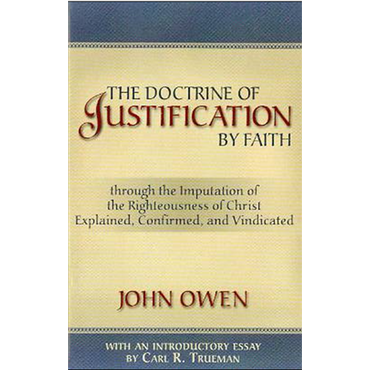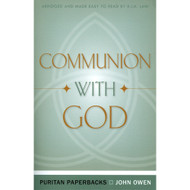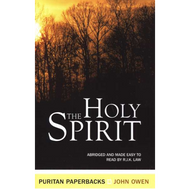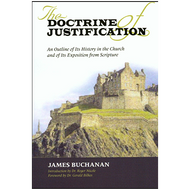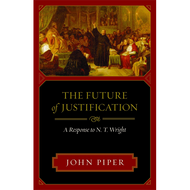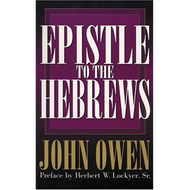Categories
Categories
The Doctrine of Justification by Faith by John Owen (Paperback)
Product Description
About the Author
John Owen (1616–1683) was an English Nonconformist church leader, theologian, and academic administrator at the University of Oxford. On 29 April he preached before the Long Parliament. In this sermon, and in his Country Essay for the Practice of Church Government, which he appended to it, his tendency to break away from Presbyterianism to the Independent or Congregational system is seen. Like John Milton, he saw little to choose between "new presbyter" and "old priest." He became pastor at Coggeshall in Essex, with a large influx of Flemish tradesmen. In March 1651, Cromwell, as Chancellor of Oxford University, gave him the deanery of Christ Church Cathedral, Oxford, and made him Vice-Chancellor of Oxford University in September 1652; in both offices he succeeded the Presbyterian, Edward Reynolds. During his eight years of official Oxford life Owen showed himself a firm disciplinarian, thorough in his methods, though, as John Locke testifies, the Aristotelian traditions in education underwent no change. With Philip Nye he unmasked the popular astrologer, William Lilly, and in spite of his share in condemning two Quakeresses to be whipped for disturbing the peace, his rule was not intolerant. Anglican services were conducted here and there, and at Christ Church itself the Anglican chaplain remained in the college. While little encouragement was given to a spirit of free inquiry, Puritanism at Oxford was not simply an attempt to force education and culture into "the leaden moulds of Calvinistic theology." Owen, unlike many of his contemporaries, was more interested in the New Testament than in the Old. During his Oxford years he wrote Justitia Divina, an exposition of the dogma that God cannot forgive sin without an atonement; Communion with God, Doctrine of the Saints' Perseverance, his final attack on Arminianism; Vindiciae Evangelicae, a treatise written by order of the Council of State against Socinianism as expounded by John Biddle; On the Mortification of Sin in Believers, an introspective and analytic work; Schism, one of the most readable of all his writings; Of Temptation, an attempt to recall Puritanism to its cardinal spiritual attitude from the jarring anarchy of sectarianism and the pharisaism which had followed on popularity and threatened to destroy the early simplicity.
Publisher's Description
John Owen presents one of the most rigorous defenses of the Reformed doctrine of justification ever written. This reprint of The Doctrine of Justification by Faith, taken from the 19th century edition produced by the Presbyterian Board of Publications, will serve as a welcome improvement for many readers. Latin and Greek quotations have been moved to footnotes, and English translations are given for those large blocks of material that Owen left untranslated. It also contains a new introductory essay by Carl R. Trueman, which analyzes Owen’s treatment of justification in light of the highly charged debates of his day. While Owen’s work is technical and challenging, this edition is an effort to make his profound exposition more manageable. "John Owen’s treatment of justification is a classic example of Reformed Orthodoxy at its best: rooted in the ongoing Anti-Pelagian trajectory of Western theology and operating within the established Protestant consensus, Owen yet demonstrates the ways in which that consensus was itself under strain, exegetically, theologically, and socially, in the seventeenth century, and how it was necessary for doctrinal formulation of the doctrine to undergo careful elaboration in order to respond to such. In particular, his defense of the imputation of Christ’s active and passive righteousness and his vigorous rejection of Baxter’s accusations that his theology was antinomian and demanded a doctrine of eternal justification, points towards the covenantal/Christological heart of his theology. As such, he is an example of how federal theology could be deployed to set the Protestant confessional consensus on a much firmer conceptual foundation than was the case in the early Reformation; and also how Reformed Orthodoxy’s theological structure is highly elaborate and irreducible to soundbites about dogmatizing; rather, Owen’s treatment exhibits the typical Reformed attention to the exegesis, doctrinal synthesis, and church consensus, and is one more piece of evidence as to how and why the Reformed faith became more elaborate in its argumentation during the course of the seventeenth century." - CARL R. TRUEMAN, from the introductory essay
Endorsement
"John Owen’s treatment of justification is a classic example of Reformed Orthodoxy at its best: rooted in the ongoing Anti-Pelagian trajectory of Western theology and operating within the established Protestant consensus, Owen yet demonstrates the ways in which that consensus was itself under strain, exegetically, theologically, and socially, in the seventeenth century, and how it was necessary for doctrinal formulation of the doctrine to undergo careful elaboration in order to respond to such. In particular, his defense of the imputation of Christ’s active and passive righteousness and his vigorous rejection of Baxter’s accusations that his theology was antinomian and demanded a doctrine of eternal justification, points towards the covenantal/Christological heart of his theology. As such, he is an example of how federal theology could be deployed to set the Protestant confessional consensus on a much firmer conceptual foundation than was the case in the early Reformation; and also how Reformed Orthodoxy’s theological structure is highly elaborate and irreducible to soundbites about dogmatizing; rather, Owen’s treatment exhibits the typical Reformed attention to the exegesis, doctrinal synthesis, and church consensus, and is one more piece of evidence as to how and why the Reformed faith became more elaborate in its argumentation during the course of the seventeenth century." - CARL R. TRUEMAN, From the Introductory Essay
 Loading... Please wait...
Loading... Please wait... 
